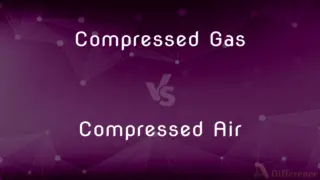Salsa vs. Picante Sauce — What's the Difference?
Edited by Tayyaba Rehman — By Fiza Rafique — Published on November 29, 2023
Salsa is a chunky blend of fresh ingredients, while Picante Sauce is smoother and spicier. Both are used as condiments.

Difference Between Salsa and Picante Sauce
Table of Contents
ADVERTISEMENT
Key Differences
Salsa, originating from the Spanish word for "sauce", typically refers to a condiment made with tomatoes, onions, peppers, and other ingredients. It's known for its chunky texture and fresh ingredients. Picante Sauce, on the other hand, is a type of salsa with a smoother texture and a spicier kick. Both Salsa and Picante Sauce have their roots in Mexican and Latin American cuisines and are used to enhance the flavors of various dishes.
Salsa is versatile and can be made with a variety of ingredients including fruits like mango or pineapple. It can be served cold and is often used as a dip or topping. Picante Sauce, in comparison, is generally served warm and may be used as a dipping sauce, a marinade, or even as an ingredient in cooking. Both Salsa and Picante Sauce are celebrated for their zesty and tangy flavors, but they serve different culinary purposes.
Salsa can be found in mild, medium, or hot varieties based on the type and amount of chili peppers used. Its chunky consistency is perfect for scooping with chips or topping on tacos. Picante Sauce, distinguished by its smoother consistency, is often hotter than the typical salsa, delivering a more intense spice to dishes. Though both Salsa and Picante Sauce contain similar base ingredients, their preparation and texture set them apart.
Many people might use the terms Salsa and Picante Sauce interchangeably due to their similarities in ingredients. However, aficionados will note the distinct texture and heat level differences. Both Salsa and Picante Sauce are beloved components in the world of condiments, with each bringing its unique flavor profile to the table.
Comparison Chart
Texture
Chunky
Smoother
ADVERTISEMENT
Heat Level
Can range from mild to hot
Generally spicier
Typical Usage
Dip, topping
Dipping sauce, marinade, cooking
Consistency
Fresh ingredients, can include fruits
Consistent, often cooked
Origin of Name
Spanish for "sauce"
Spanish for "spicy"
Compare with Definitions
Salsa
A type of Latin American dance characterized by quick steps.
They danced the salsa all night long.
Picante Sauce
A spicy sauce with a smooth texture.
He added picante sauce to his eggs for a kick.
Salsa
A chunky blend of fresh ingredients.
She dipped her chip into the fresh salsa.
Picante Sauce
A variant of salsa with added heat.
Between salsa and picante sauce, she chose the latter for its spiciness.
Salsa
A genre of music originating from Latin America.
He turned up the radio when his favorite salsa song played.
Picante Sauce
A blend of tomatoes, peppers, and spices.
She loved the rich blend of flavors in the picante sauce.
Salsa
A mixture used as a condiment, especially in Mexican cuisine.
Tacos taste better with a bit of salsa on top.
Picante Sauce
A condiment often used in cooking.
The recipe called for two tablespoons of picante sauce.
Salsa
A spicy tomato-based sauce.
She added salsa to her burrito for extra flavor.
Picante Sauce
A sauce derived from Spanish and Mexican cuisines.
Picante sauce is a staple in many Mexican dishes.
Salsa
A spicy sauce of chopped, usually uncooked vegetables or fruit, especially tomatoes, onions, and chili peppers, used as a condiment.
Salsa
A genre of Latin American music characterized by Afro-Caribbean rhythms, Cuban big-band arrangements, and elements of jazz and rock.
Salsa
A dance for couples performed to this music.
Salsa
(countable) A spicy tomato sauce, often including onions and hot peppers.
Salsa
A style of urban music originally from New York heavily influenced by Cuban dance music, jazz and rock.
Salsa
Any of several dances performed to salsa music.
Salsa
(intransitive) To dance the salsa.
They salsaed late until the night.
Salsa
Spicy sauce of tomatoes and onions and chili peppers to accompany Mexican foods
Common Curiosities
How does Picante Sauce differ from Salsa?
Picante Sauce is smoother and generally spicier than Salsa.
What is salsa made of?
Salsa is made of a blend of fresh ingredients like tomatoes, onions, peppers, and sometimes fruits.
Can I use Salsa and Picante Sauce interchangeably?
While they have similar ingredients, their texture and heat levels differ, so it depends on the dish.
Is Picante Sauce used in traditional Mexican cuisine?
Yes, Picante Sauce is a staple in many traditional Mexican dishes.
Can Salsa have fruits in it?
Yes, there are fruit salsas made with ingredients like mango or pineapple.
Can I cook with Picante Sauce?
Yes, Picante Sauce can be used in cooking, as a marinade, or as a dipping sauce.
Is Salsa always spicy?
No, Salsa can range from mild to hot depending on the chili peppers used.
What does the word "salsa" mean?
Salsa is Spanish for "sauce."
Is Picante Sauce always tomato-based?
While many Picante Sauces are tomato-based, variations might include other primary ingredients.
How long can I store Salsa in the fridge?
Most homemade Salsas can be stored in the fridge for up to a week.
Why is Picante Sauce often hotter than Salsa?
Picante, meaning "spicy" in Spanish, often has a higher concentration of chili peppers.
Are Salsa and Picante Sauce suitable for vegetarians?
Generally, yes. Both are usually made from vegetables and spices, but always check the ingredients.
Which is chunkier, Salsa or Picante Sauce?
Salsa typically has a chunkier texture, while Picante Sauce is smoother.
Can I use Picante Sauce as a base for other sauces?
Yes, Picante Sauce can be a flavorful base for various sauces or dishes.
Can I make Salsa at home?
Absolutely, Salsa can be made with fresh ingredients for a homemade taste.
Share Your Discovery

Previous Comparison
Compressed Gas vs. Compressed Air
Next Comparison
Full Moon vs. New MoonAuthor Spotlight
Written by
Fiza RafiqueFiza Rafique is a skilled content writer at AskDifference.com, where she meticulously refines and enhances written pieces. Drawing from her vast editorial expertise, Fiza ensures clarity, accuracy, and precision in every article. Passionate about language, she continually seeks to elevate the quality of content for readers worldwide.
Edited by
Tayyaba RehmanTayyaba Rehman is a distinguished writer, currently serving as a primary contributor to askdifference.com. As a researcher in semantics and etymology, Tayyaba's passion for the complexity of languages and their distinctions has found a perfect home on the platform. Tayyaba delves into the intricacies of language, distinguishing between commonly confused words and phrases, thereby providing clarity for readers worldwide.













































